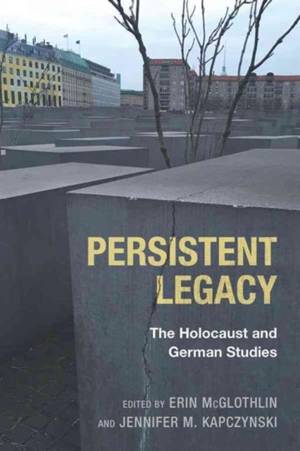
- Retrait gratuit dans votre magasin Club
- 7.000.000 titres dans notre catalogue
- Payer en toute sécurité
- Toujours un magasin près de chez vous
- Retrait gratuit dans votre magasin Club
- 7.000.000 titres dans notre catalogue
- Payer en toute sécurité
- Toujours un magasin près de chez vous
Persistent Legacy
The Holocaust and German Studies
209,45 €
+ 418 points
Description
New essays by prominent scholars in German and Holocaust Studies exploring the boundaries and confluences between the fields and examining new transnational approaches to the Holocaust. In studies of Holocaust representation and memory, scholars of literature and culture traditionally have focused on particular national contexts. At the same time, recent work has brought the Holocaust into the arena of the transnational, leading to a crossroads between localized and global understandings of Holocaust memory. Further complicating the issue are generational shifts that occur with the passage of time, and which render memory and representations of the Holocaust ever more mediated, commodified, and departicularized. Nowhere is the inquiry into Holocaust memory more fraught or potentially more productive than in German Studies, where scholars have struggled to addressGerman guilt and responsibility while doing justice to the global impact of the Holocaust, and are increasingly facing the challenge of engaging with the broader, interdisciplinary, transnational field. Persistent Legacy connects the present, critical scholarly moment with this long disciplinary tradition, probing the relationship between German Studies and Holocaust Studies today. Fifteen prominent scholars explore how German Studies engages with Holocaust memory and representation, pursuing critical questions concerning the borders between the two fields and how they are impacted by emerging scholarly methods, new areas of inquiry, and the changing place of Holocaust memory in contemporary Germany. Contributors: David Bathrick, Stephan Braese, William Collins Donahue, Tobias Ebbrecht-Hartmann, Katja Garloff, Andreas Huyssen, Irene Kacandes, Jennifer M. Kapczynski, Sven Kramer, Erin McGlothlin, Leslie Morris, Brad Prager, Karen Remmler, Michael D. Richardson, Liliane Weissberg. Erin McGlothlin and Jennifer M. Kapczynski are both Associate Professors in the Department of Germanic Languages andLiteratures at Washington University in St. Louis.
Spécifications
Parties prenantes
- Editeur:
Contenu
- Nombre de pages :
- 328
- Langue:
- Anglais
- Collection :
- Tome:
- n° 3
Caractéristiques
- EAN:
- 9781571139610
- Date de parution :
- 22-11-16
- Format:
- Livre relié
- Format numérique:
- Genaaid
- Dimensions :
- 152 mm x 229 mm
- Poids :
- 648 g






